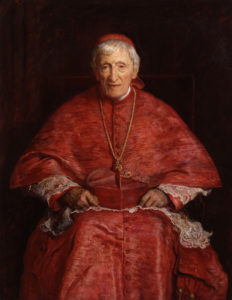
In his Idea of a University, St. John Henry Cardinal Newman expounds on a great many ideas, the principal of which is that a University is meant to teach someone about universal knowledge, to raise the mind of an individual to a new view and perspective of the world. Subordinate to this principle is that this type of education is only possible if all realms of knowledge are included, especially theology and religion. Reason informs us well enough about the existence of God, and faith and divine revelation shows how He is present with us, but education means studying the science, the knowledge, of God as much as studying the science of anything else.
Furthermore he argues that education must not be pursued for pragmatic means. If one seeks and receives education for the purpose of improving their skill in some trade or task then that education becomes subordinated to that trade or task. This type of education is fine, but Newman argues that universal education, education about the universal, needs to be a good in its own sake. It is good to know more about the universe, and therefore universal education to achieve the knowledge is also good for its own sake. To subordinate menial worldly tasks to this more universal good is a subversion of that good, and inappropriate. Knowledge that comes to be possessed by someone forever changes that person and increases their good. Useful knowledge increases the worldly pleasure of a man, but universal knowledge, properly useless knowledge, improves the intellect and the ability of an intellect to reason, and this is a good achieved for its own sake. He refers to classical thinkers, who highlight the fact that once man has fulfilled his basic needs he is inclined to contemplate, and universal education fosters that contemplation and ability to do it like no other. Universal education, liberal education, is meant to draw us out of our tic for tac worldly perspective and shows us the higher ways of the world.
Seeing this, before looking at language education, one may be convinced that language education, especially foreign language education, is a subject matter of extrinsic and pragmatic goods first before all. But Newman goes on to specifically address the education around language, and his thoughts are relevant to why someone would learn a language different from their own. Comparing his outlook on education to that of his contemporaries, he juxtaposes education for the advancement of the useful arts with education for the cultivation of the mind.
Thinking about language at all, Newman highlights how individually unique language is. Where does it work, first? As a cultivation of the mind or as a useful art? Language has a unique power as it actually accompanies reason in the process of its function. He calls to mind the meaning of the Greek logos, which means both speech and reason. These elements, he says, are deeply intertwined and inseparable. When understanding the nature of words, it is important, in his opinion, to recognize the inherent bond they share with reason. He claims that his contemporaries wish to have separated these two elements and wish to say that one man may be good at reason while the other at waxing words, but he shoots back that such a divide speaks as them being separated, while in fact language should be “the lawful wife in her own house” [married to reason].
The combination of language to reason, and the fact that every man’s reason stands to a degree on its own, pushes Newman to say that language is therefore individual and unique. As it combines between person and person, there is still the notion that words form first from certain people and then spread outwards. This is no more true than in literature, in the writing of any certain author. The language chosen by that specific author may have objectively good notions and principles, but the uniqueness of the language also stands out and is necessary for understanding the author on a deep level. For the recipients of such a text, it is important, in Newman’s mind, for them to approach that text in the text’s original language. By seeing and understanding the initial language, students, or the recipients, will have much more to understand out of the text.
So language is not just a useful art or cultivation of the mind – it serves in the middle. But language mediating thoughts is no simple notion. Words are literally the vehicles between soul and body, cementing things, that are first brought into the mind, into the brain as well. Without language there is no mediation of reason. Newman’s concept of language heavily relies on the philosophy of St. Thomas Aquinas, and there are multiple premises at hand to understand it. The first premise is that worldly thing exist in a unique combination of act and potency, the act of a thing being its abstract form. The second premise is that human comprehension is a matter of possessing forms within an individual’s mind, within the intellect of the soul. A third premise, not explicitly stated within Newman and not carefully expounded on within Thomas Aquinas’ work, is the notion that a human possessed form is called a quiddity.
The idea of a quiddity is where I believe Newman to situate the uniqueness of language, and what necessitates the study of foreign language for liberal education. According to Aquinas it is possible for someone to understand a word but attribute the wrong form to it, or vice versa. Naturally when learning about things in the world, humans do not understand them perfectly from the beginning. It is necessary for them to, over time, compose or divide forms that they have learned in order to perfect their knowledge. It is this that a liberal education does best, per the opinion of Newman. Consequentially for language, though, it means that the forms that we possess in our minds may not perfectly resemble the forms of the world. One comes to possess a general form of dog, not specific to any one species, as is proper to the existence of a form, but that form may not perfectly be the form of dog that exists in the world. It may lack certain aspects, like an understanding of the powers of organs within actual form of dog, or it may have additional aspects if a dog has never been closely observed by someone, such as the power within a dog to fly (which is simply not true). If 100% of a form exists in the world, the quiddity attains a certain percentage of that form as is seen and understood by the person perceiving it. It is this quiddity that St. Thomas says is the form of ‘material’ words, and it is the uniqueness of the quiddity and the many quiddities of words that gives rise to the uniqueness of language that Newman discusses.
Each language, then, presents a certain amount of a unique perspective on the world. Each language in its communication and existence within human minds is an imperfect capturing of reality, and if the purpose of liberal education is to raise up and cultivate the mind to view reality in a much more rational fashion, it serves the liberally educated to study multiple languages so as to gain extra insight into the nature of reality. Newman specifically mentions teaching foreign languages as a necessity. While not bringing up the notion that other languages in general aid in the mission of liberal education, he does discuss the study of literature. He talks about reading classics of literature, works derived from an author’s specific experience, in their original language. Only in reading it in their original language, he claims, can one perceive the specific beauty of their craft, which then serves the mission of liberal education.
Language does the impossible. Normally a combination of form and matter constitutes an object in the natural world, but language provides a different substance, a matter of sound and writing to forms that otherwise already have a natural pairing in matter. Language, an artifact of human experience, marries itself to the abstract forms within our minds and replaces the substance of the world for the mere sake of communication. Our own language, and most certainly language other than our own, deserve to be of incredible import to one’s education.


One Reply to “What does St. John Henry Cardinal Newman Have to Say About Learning a Language?”